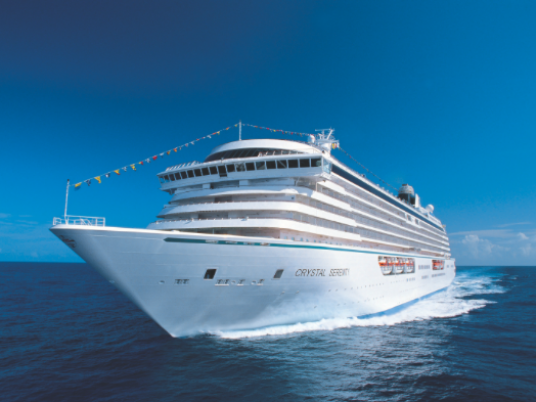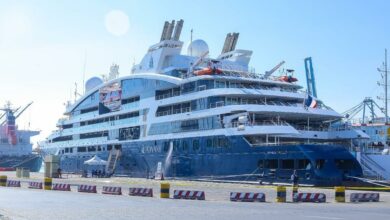Aswan–When the M/S Eugenie first cruised the length of Lake Nasser in 1993, its passengers sipped whiskey sours on the polished oak sundeck of the stately vessel as it slipped past the barren peaks, virgin dunes and mysterious temples that lined the lake’s shore. The mock paddlewheel boat–at that time the only cruise ship on the vast reservoir–offered a refreshing alternative to glitzy Nile package cruises by providing well-heeled tourists with serene, unspoiled beauty.
“When I first started this project in the late 1980s, everybody said I was crazy because there was nothing to see beyond the Aswan High Dam–it was just water, sand and a bunch of small temples,” recalls Moustafa al-Guindi, founder of the company that owns the M/S Eugenie. “But when we launched the boat, we found that this was a product that people were looking for: serenity, relaxation and scenery.”
As with any good idea that turns a profit, it was just a matter of time before others followed suit. Within a few years, half a dozen “floating hotels” were cruising the lake, ferrying tourists to Amada, Wadi al-Seboua and as far south as the temple of Abu Simbel.
Environmentalists raised alarm over the cumulative pollution created by the boats, which spilled fuel and partially treated sewage into the lake, and generated solid waste that rarely made it to a landfill. Investors, meanwhile, argued that the six boats had diluted the client pool.
“Even in high season, most voyages operate at just 40-60 percent capacity,” says al-Guindi.
While there was clearly no going back once the licenses were issued and capital invested, the problems associated with the six cruise boats appeared surmountable. Stakeholders in the lake accepted the presence of the boats, but urged the government to enact tighter environmental control and improve safety procedures and equipment. They also sought better on-shore waste treatment and fuel-handling facilities.
Few suspected, however, that the Ministry of Tourism was quietly pursuing its own agenda. It was only last year that the various stakeholders learned the details.
Sources close to Tourism Minister Zoheir Garana say the ministry has approved licenses for 19 new floating hotels to operate on Lake Nasser, bringing the total to 25. The ministry has also agreed to build a new marina to replace the makeshift dock currently used to berth cruise ships. The price tag on the new facility is estimated at LE25 million.
“The marina will be built on the east side of the High Dam to accommodate the 25 cruise ships,” an Aswan Governorate official confirmed. “The design and location are still under study.”
Ahmed Attiya, head of the Hotels Sector at the Ministry of Tourism, says the cruise ship expansion could generate up to LE950 million in direct investment and create thousands of jobs.
“Floating hotels provide employment, both directly and indirectly, to five workers for every cabin,” he says. “Most of these ships have around 70 cabins, so the economic benefit could be substantial.”
Critics have called on the Ministry of Tourism to drop the expansion plan, warning of “catastrophic” environmental consequences if the number of floating hotels on the lake increases. Some of the most vocal opposition has come from within the ministry itself.
“Lake Nasser is a stagnant body of water, so bacteria spread very quickly and even a small amount of pollution can [contaminate] the water,” explains Mahmoud al-Qaissouni, environmental advisor to the tourism minister. “The lake is Egypt’s primary source of water, so any pollution here affects the entire population of the Nile Valley, or more than 60 million people.”
Al-Qaissouni says the expansion plan, originally drawn up during the tenure of former Tourism Minister Mamdouh al-Beltagui, was endorsed by former Water Minister Mahmoud Abu-Zeid, who rejected the advice of his predecessor.
“Before these boats started operating about 20 years ago, the irrigation minister at that time, Dr. [Abdel Hadi] Rady, said Lake Nasser could accommodate a maximum of three floating hotels,” al-Qaissouni recalls. “Now there are six floating hotels on the lake, and we’ve seen that they do not follow proper waste treatment procedures. If you add [19 more] cruise boats, it will be a disaster.”
Environmental concerns aside, al-Qaissouni sees the decision to license more floating hotels on the lake as a reckless tourism strategy. In the short-term, the new ships will cannibalize business from the existing ones; in the long-term, they will lead to overcrowding at the lake’s antiquity sites.
“The floating hotels on Lake Nasser are never fully booked, so if you put 25 cruise boats on the lake this is going to negatively affect all of them. They’re all going to lose,” he says.
He argues that instead of expanding boat traffic on the lake, the government should focus on developing sustainable use of Lake Nasser as a strategic water resource. Efforts should be made to enforce strict environmental controls on the six floating hotels, 4,000 fishing boats and two passenger ferries that currently operate on the lake. It might also be time to think seriously about incorporating Egypt’s main water reservoir–the source of over 80 percent of the country’s freshwater supply–into a natural protectorate.
“Logically, Lake Nasser has to be a protected area because it is more important than all of the other protectorates in Egypt as this is our life source,” al-Qaissouni says.




